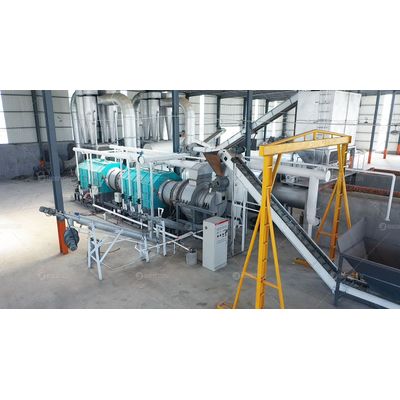

- Home
- Companies
- Beston Group Co., Ltd.
- Articles
- Investment Strategy for High-Quality ...

Investment Strategy for High-Quality Charcoal Making Machine
Investing in a high-quality charcoal making machine can be a profitable venture, given the rising demand for sustainable and eco-friendly energy sources. However, to maximize returns, it is crucial to develop a comprehensive investment strategy. This strategy should encompass market analysis, cost assessment, technology evaluation, and risk management. Below, we explore these elements in detail to provide a clear roadmap for prospective investors.
Market Analysis
Demand and Supply Dynamics
Understanding the market dynamics is the first step in crafting a successful investment strategy. The global market for charcoal is experiencing significant growth, driven by increasing demand from industries such as metallurgy, agriculture, and energy production. Additionally, the popularity of charcoal for domestic use, especially in grilling and heating, remains strong.
Target Markets
Identifying target markets is essential for optimizing sales and profitability. Key markets include regions with abundant raw material supply, such as Africa and South America, and regions with high demand for charcoal, like Europe and North America. Conducting a thorough analysis of local regulations, import-export policies, and consumer preferences can provide valuable insights for market penetration strategies.
Cost Assessment
Initial Investment
The initial investment in a high-quality charcoal making machine includes the purchase price, shipping costs, installation, and initial setup. The charcoal making machine price varies widely based on the machine's capacity, technology, and manufacturer. High-capacity machines with advanced features generally command higher prices but offer better efficiency and output quality.
Operational Costs
Operational costs encompass raw material procurement, labor, energy consumption, maintenance, and waste management. Efficient machines tend to have lower operational costs due to reduced energy consumption and higher yield rates. Evaluating these costs is crucial for estimating the breakeven point and overall profitability.
Financial Projections
Developing detailed financial projections helps in assessing the feasibility and potential returns of the investment. This includes calculating expected revenues, operational costs, net profits, and return on investment (ROI). Sensitivity analysis should be performed to understand the impact of variables such as raw material prices, labor costs, and market demand fluctuations on profitability.
Technology Evaluation
Machine Specifications
Selecting the right charcoal making machine involves evaluating various technical specifications. Key parameters include production capacity, energy efficiency, automation level, and the quality of the charcoal produced. Advanced machines offer features such as continuous feeding, automated control systems, and integrated waste heat recovery, enhancing productivity and sustainability.
Technological Advancements
Keeping abreast of technological advancements in charcoal production is vital. Innovations such as biomass gasification, pyrolysis technology, and advanced filtration systems can significantly improve the efficiency and environmental footprint of charcoal making. Investing in state-of-the-art technology ensures compliance with environmental regulations and positions the business as a leader in sustainable practices.
Supplier Assessment
Choosing a reputable supplier is crucial for ensuring the quality and reliability of the charcoal making machine. Factors to consider include the supplier's industry experience, after-sales service, warranty terms, and customer reviews. Establishing long-term relationships with reliable suppliers can facilitate access to technical support and spare parts, minimizing downtime and operational disruptions.
Risk Management
Regulatory Compliance
Navigating regulatory requirements is a critical aspect of risk management. This includes adhering to environmental regulations, obtaining necessary permits, and ensuring worker safety. Non-compliance can result in legal penalties, operational shutdowns, and reputational damage. Staying informed about local and international regulations helps in preemptively addressing compliance issues.
Environmental Considerations
Environmental sustainability is increasingly becoming a focal point for investors and consumers alike. Implementing eco-friendly practices such as using renewable raw materials, reducing emissions, and managing waste responsibly can enhance the business's reputation and attract environmentally conscious customers. Investing in technology that minimizes environmental impact aligns with global sustainability goals and regulatory trends.
Market Risks
Market risks include fluctuations in raw material prices, changes in consumer preferences, and competition from alternative energy sources. Diversifying the product portfolio to include various types of charcoal and by-products such as bio-oil and syngas can mitigate these risks. Additionally, developing robust marketing strategies and establishing strong distribution networks can help in maintaining market share.
Operational Efficiency
Process Optimization
Optimizing the production process is essential for maximizing efficiency and profitability. This includes streamlining raw material handling, enhancing machine maintenance routines, and implementing quality control measures. Continuous monitoring and analysis of production metrics can identify bottlenecks and areas for improvement, leading to increased output and reduced operational costs.
Workforce Training
Investing in workforce training ensures that operators are proficient in handling the charcoal briquettes machine for sale and adhering to safety protocols. Skilled operators can maximize machine efficiency, minimize downtime, and maintain high product quality. Regular training programs and certification courses can keep the workforce updated on the latest technological advancements and best practices.
Quality Assurance
Maintaining high product quality is crucial for building a reputable brand and ensuring customer satisfaction. Implementing rigorous quality assurance processes, from raw material selection to final product inspection, helps in delivering consistent and superior quality charcoal. Utilizing advanced testing and analysis tools can ensure compliance with industry standards and customer specifications.
Marketing and Distribution
Branding and Positioning
Effective branding and positioning strategies differentiate the business from competitors and highlight the unique value propositions of the charcoal making machine. Emphasizing aspects such as sustainability, product quality, and technological innovation can attract a broader customer base. Developing a strong brand identity through consistent messaging and visual elements enhances market recognition and loyalty.
Sales Channels
Identifying and leveraging diverse sales channels is vital for reaching target customers and maximizing sales. These channels can include direct sales, online platforms, distributors, and partnerships with retailers. Analyzing the effectiveness of each channel helps in allocating resources efficiently and optimizing the sales strategy.
Customer Engagement
Building strong relationships with customers is essential for long-term success. This involves providing exceptional customer service, soliciting feedback, and addressing concerns promptly. Engaging with customers through various touchpoints, such as social media, newsletters, and industry events, fosters loyalty and encourages repeat business.
Conclusion
Investing in a high-quality charcoal making machine requires a multifaceted strategy that encompasses market analysis, cost assessment, technology evaluation, and risk management. By understanding the demand and supply dynamics, assessing financial implications, selecting the right technology, and implementing effective operational and marketing practices, investors can maximize their returns and contribute to sustainable development. As the global market for charcoal continues to grow, strategic investments in advanced charcoal making machines will play a pivotal role in meeting the demand for eco-friendly energy solutions.
